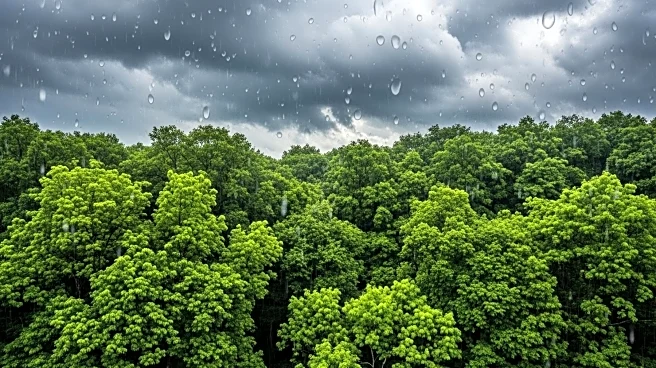What is the story about?
What's Happening?
Recent research published in Nature Communications indicates that Earth's land carbon sink, a crucial component in absorbing carbon dioxide emissions, is faltering due to climate-driven extremes. In 2023 and 2024, the land carbon sink was significantly reduced, with 2023 seeing a 50% decrease compared to the average over the past decade. This decline was attributed to major wildfires and slow vegetation growth in the northern hemisphere, followed by extreme heat, drought, and fires in the Amazon. The situation worsened in 2024, with the sink reaching its lowest point in over a decade, primarily due to heat and wet conditions accelerating decomposition. These events led to the largest single-year increase in atmospheric CO₂ levels on record, despite stable fossil fuel emissions.
Why It's Important?
The weakening of the land carbon sink has profound implications for global climate action. This natural buffer has historically absorbed a significant portion of human-generated CO₂ emissions, helping to mitigate climate change. Its decline could accelerate global warming, making it more challenging for countries to meet emissions targets set under international agreements like the Paris Agreement. The loss of this sink would necessitate more rapid reductions in emissions from other sources, potentially impacting economic and policy decisions worldwide. The situation underscores the urgency of addressing climate change and implementing strategies to protect and restore ecosystems.
What's Next?
Researchers are closely monitoring the situation to determine if the decline in the land carbon sink is a temporary anomaly or indicative of a longer-term trend. The potential disappearance of this sink would require countries to reassess their climate strategies and possibly increase efforts to reduce emissions from other sectors. There is a growing emphasis on protecting, restoring, and managing ecosystems to slow down the sink's demise. Strategies such as sustainable forest management, climate-friendly farming practices, and prescribed burns are being considered to enhance the land carbon sink's capacity.
Beyond the Headlines
The decline of the land carbon sink highlights the complex interplay between climate change and ecological systems. It raises ethical and policy questions about human responsibility in managing natural resources and the need for global cooperation to address environmental challenges. The situation also points to the importance of integrating ecological considerations into economic and policy frameworks to ensure sustainable development.















